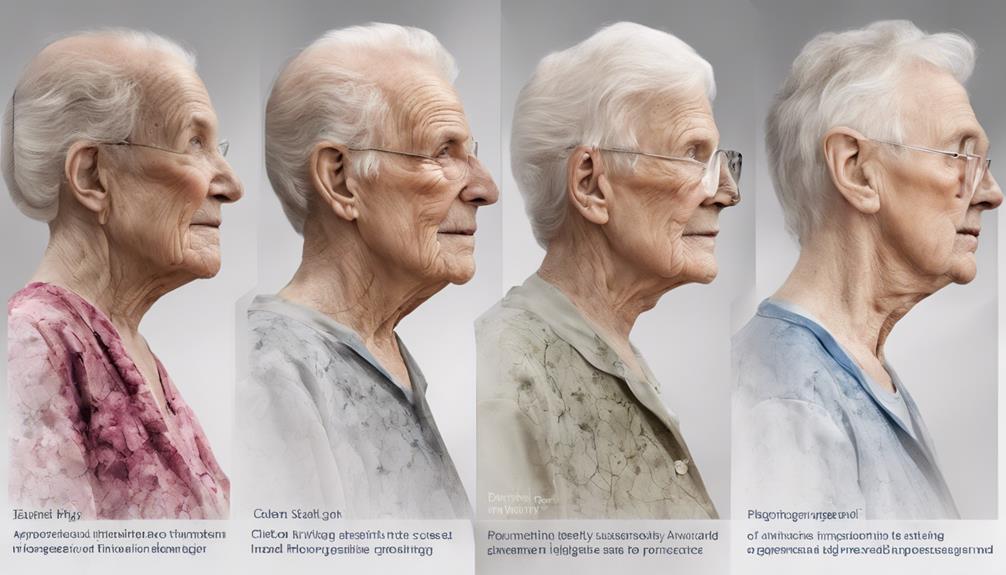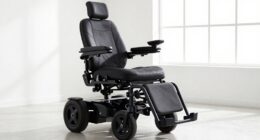If you have an interest in discovering the particular requirements for hospice eligibility in dementia patients according to the Fast Scale, it is crucial to grasp the progression of cognitive decline across various stages.
By pinpointing the Fast Scale stage that indicates end-stage dementia, healthcare providers can determine when hospice care becomes necessary for individuals with advanced dementia.
This knowledge not only impacts decision-making processes but also plays a crucial role in ensuring that individuals receive the appropriate level of care tailored to their unique needs at this critical juncture.
Key Takeaways
- Hospice criteria for dementia rely on the Fast Scale, with a score of 7A indicating end-stage dementia.
- Fast Scale assessment helps determine eligibility for hospice by indicating severe cognitive decline.
- Hospice care in dementia focuses on symptom management, emotional support, and tailored care plans.
- Utilizing the Fast Scale ensures appropriate support for individuals with advanced dementia in hospice settings.
Overview of the Fast Scale for Dementia
In understanding the Fast Scale for dementia, you'll gain insight into a tool that stages the progression of cognitive decline from normal function to end-stage deterioration. The Fast Scale, also known as the Functional Assessment Staging (FAST), plays a crucial role in assessing individuals with advanced dementia to determine their eligibility for hospice care.
This assessment evaluates both cognitive and functional abilities, providing healthcare professionals with a comprehensive understanding of the level of care required for each individual.
Utilizing the Fast Scale, healthcare providers can accurately identify the stage of dementia a patient is in, with Stage 7A indicating end-stage dementia where individuals require around-the-clock assistance with daily activities.
Understanding Fast Scale Stages

Navigating the Fast Scale stages in dementia provides a detailed roadmap for assessing cognitive and functional decline in individuals. The FAST Scale consists of 7 stages, with Stage 7A indicating end-stage dementia, where individuals experience severe cognitive and functional impairment. In this stage, individuals require assistance with most activities of daily living (ADLs), highlighting the need for specialized dementia care.
Understanding the Fast Scale stages is crucial for determining hospice eligibility, as Stage 7A is often a criterion for entering hospice care. Medicare's Local Coverage Determination considers the FAST Scale in evaluating hospice eligibility, emphasizing the importance of accurate assessment in providing end-of-life support tailored to the individual's needs.
Fast Scale Criteria for Hospice Eligibility
Understanding the criteria outlined by the FAST Scale for hospice eligibility in dementia is essential for providing tailored end-of-life care to individuals with advanced cognitive and functional decline. The FAST Scale criteria indicate that individuals with a score of 7A or higher are considered to have reached end-stage dementia. At this stage, they typically require assistance with most activities of daily living (ADLs).
Medicare's Local Coverage Determination (LCD) utilizes the FAST Scale as a guideline for determining hospice eligibility. This staging system plays a crucial role in guiding healthcare decisions, ensuring appropriate hospice care levels for those with advanced dementia.
Types of Dementia and Progression

As different types of dementia progress through distinct stages with varying rates of cognitive decline, understanding these variations is crucial for providing tailored care to individuals affected by this condition.
When considering dementia progression, particularly in Alzheimer's disease, the stages identified by the Functional Assessment Staging Tool (FAST) play a significant role in determining eligibility for hospice care.
Here are some key points to consider:
- Alzheimer's Disease Progression: Alzheimer's disease follows a progressive course with distinct stages of cognitive decline, affecting memory, reasoning, and daily functioning.
- Functional Assessment Staging Tool (FAST): The FAST Scale helps clinicians assess dementia progression based on seven stages, each representing specific cognitive impairments and limitations in daily activities.
- Determining Eligibility: FAST scores are used to determine eligibility for hospice care by evaluating the individual's functional abilities and cognitive decline.
- Tailored Care: Understanding the stages of dementia progression allows for personalized care plans that address the specific needs and challenges faced by individuals with dementia.
Role of Hospice in Dementia Care
In dementia care, hospice plays a crucial role in providing specialized support for individuals in advanced stages of the disease. Hospice care for dementia focuses on addressing pain management, symptom relief, and emotional well-being, ensuring that those with dementia receive the care they need during this difficult time. These specialized services are tailored to meet the unique needs of individuals in advanced stages of dementia, offering both medical and emotional support to enhance their quality of life. Hospice teams, consisting of nurses, doctors, social workers, counselors, and volunteers, work collaboratively with families to provide comprehensive care, education, and emotional guidance. This multidisciplinary approach ensures that all aspects of care are covered, creating a support system for both the individual with dementia and their loved ones. By offering support for families dealing with end-stage dementia, hospice care enhances overall care and provides comfort during a challenging period.
| Hospice Care for Dementia | Benefits |
|---|---|
| Specialized Support | Tailored care for advanced stages |
| Pain Management | Relief from discomfort |
| Symptom Relief | Addressing specific symptoms |
| Emotional Well-being | Providing emotional support |
Frequently Asked Questions
What Is the Fast Scale for Dementia Patients?
The FAST Scale for dementia patients is a tool that assesses cognitive and functional decline. It consists of seven stages indicating specific impairments.
People with a score of 7A or higher are considered in the end-stage of dementia. This scale helps healthcare providers understand disease progression and plan appropriate care.
Its use is crucial in determining hospice eligibility for individuals with dementia. Understanding the FAST Scale aids in providing compassionate and tailored support for those in need.
What Qualifies a Dementia Patient for Hospice?
When considering hospice for a loved one with dementia, it's essential to focus on their needs and quality of life. Determining if they qualify involves assessing their overall decline and level of care required.
Understanding the stages of dementia and how they impact daily living activities is key. By recognizing these signs, you can ensure your loved one receives the specialized care and support they deserve in their end-of-life journey.
What Is the Dementia Scale Score?
When it comes to the dementia scale score, it's crucial to understand the progression of cognitive and functional decline.
The FAST Scale, with its seven stages, provides a comprehensive assessment of these changes.
By recognizing where an individual falls on the scale, you can better gauge their level of impairment and the need for hospice care.
This knowledge is essential for tailoring the support and services necessary for those with advanced dementia.
What Is the Reisberg Scale for Dementia?
Oh, the Reisberg Scale, also known as the FAST Scale, delves into the intricate levels of cognitive and functional decline in dementia.
It meticulously outlines seven stages, each pinpointing specific impairments and limitations.
You'll find that this tool, developed by Dr. Barry Reisberg, plays a crucial role in assessing dementia progression and determining hospice eligibility for those in the end stages of this challenging condition.
Conclusion
In conclusion, when considering hospice care for dementia using the Fast Scale, it's important to understand the progression of the disease and the criteria for eligibility.
One interesting statistic to note is that approximately 70% of individuals with dementia will reach end-stage dementia, making it crucial to have a comprehensive understanding of the Fast Scale for appropriate care and support tailored to their needs.
Remember, each individual's journey with dementia is unique and requires personalized attention and compassion.









